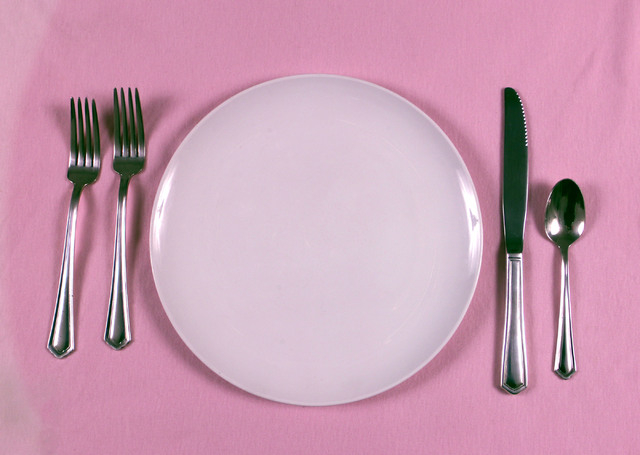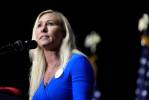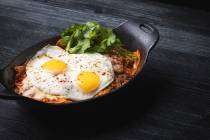Obesity is No. 1 risk for breast, other cancers

Interested in knowing what you should eat to minimize your risk of breast cancer and other types of cancer? It’s simple — and it’s something you’ve heard many times before.
“I don’t know that there’s anything that I would say that’s specific, beyond what we view these days as being a healthy diet,” oncologist Heather Allen said.
“The bottom line is, what’s healthy for the body when it comes to cardiovascular risk works for cancer as well,” oncologist Fadi Braiteh said.
But, of course, there’s a caveat to that.
“Unfortunately,” Allen said, “it’s not the diet that a lot of people in this country follow.”
From the aspect of what goes into your body, the breakdown is pretty simple. Braiteh said the keys are low carb, low fat and high protein.
“Certainly looking at fruits and vegetables, good whole grains,” Allen said. “If you’re going for a protein source, minimizing the red meat — more fish, maybe chicken. Watching more of the sugar and fats.
“But there’s nothing really radical about that.”
But both physicians stress that what comes out of your body — in terms of calories and fat burned — is even more important than what goes in.
“The No. 1 increased risk for cancer is obesity,” Braiteh said. “So, being healthy and fit, body mass index, having more lean muscle and less fat tissue is the goal. It’s not just how much you weigh on the scale, it’s how you look.”
Which brings us back to diet, at least as a starting point.
“The first thing is to try to choose food and drink that help you to get and maintain healthy weight,” said Mary Wilson, a registered dietitian and extension nutrition specialist with the University of Nevada Cooperative Extension. “Limit how much processed meat and red meat you eat; with processed meats, the use of nitrites to preserve it can be a risk. Eating at least 2½ cups of fruits and vegetables a day can reduce the risk of some types of cancer, and choosing more whole grains than unrefined grains.”
But Braiteh said that to help reduce the risk of cancer, the exercise you get has to be the type that will challenge your cardiovascular system.
“It’s not just walking in the park that’s going to do the trick,” he said.
Studies have shown that women who have survived breast cancer are more likely to reduce the risk of the cancer coming back if they exercise regularly. It’s important, he said, to keep lean muscle up, fat tissue down, by exercising regularly at least three times a week, with an emphasis on cardio, such as on a treadmill or elliptical trainer.
If you’re not successful in preventing cancer, Braiteh said diet also plays a role in treatment and recovery. Nutritional needs become much more complex, he said, because of the often-fraught relationship between food and treatments such as chemotherapy, which can cause nausea, vomiting and diarrhea.
“Taste is altered,” he said. “Even the foods they used to like, they don’t like.”
“Sometimes,” Allen said, “if people are going through treatments, whether it be chemotherapy or whether it be radiation, we sometimes have to alter diets because, No. 1, patients will often lose their taste. Things will taste bitter or metallic.”
Sometimes, she said, work-arounds can help. If the person being treated simply has no appetite, multiple small meals — especially of “high-calorie food that are a lot of bang for your buck” — are suggested. So, sometimes, are liquid supplements such as Ensure or Boost.
Braiteh said those small meals should, again, focus on high protein.
“Stay away from high carbs and high sugars that fill you immediately,” he said.
And, he said, it’s best to avoid nutritional supplements other than a multivitamin unless they’re suggested by your doctor, because they can feed the cancer cells as well as the healthy body. A lot of people, he said, figure they may not benefit from them, but they won’t harm them.
“It might very much harm,” he said.
The physicians said other factors can affect the diet of people undergoing treatment and whether their nutritional needs are met.
“People have a lot of fatigue,” Allen said. “If they’re the ones trying to make the meals, they don’t feel like doing the shopping and the cooking, so you try to get by with things that are easy to prepare and can be prepared ahead of time, during times when they have more energy.”
Soups, pudding and similar foods that go down easily are often recommended, she said.
“Foods that have a strong odor are generally not a good idea because that can affect someone who could be nauseated,” Allen said. “You usually don’t want anything that’s very spicy, although for some people that’s their normal diet.
“It’s not a one-size-fits-all. You’re really trying to work with the foods that the person normally likes, to encourage them to use those foods.”
And beverages. Braiteh said hydration also is very important.
“The biggest challenge that people forget about is getting dehydrated easily,” he said. “Because of the chemotherapy, people lose the urge to thirst. We should not rely on thirst.”
The emphasis when it comes to beverages, he said, should be on water, teas, iced teas and Gatorade. Alcohol, he said, should be avoided because it acts as a diuretic.
Wilson said research hasn’t proven or disproved a connection between breast cancer and soy foods.
“There just isn’t anything to say,” she said. “We just don’t have enough information. It doesn’t appear that there is an issue. There have been a couple of things to raise your eyebrows, but nothing definitive enough to release to the general public. It’s just not clear enough to know.”
And so it’s back to the basics.
“I don’t know that there is any superfood,” Allen said. “Organic makes a lot of sense, but I don’t know that there are any data to support that. People can get pretty opinionated about this. I think you want to sort out what’s been substantiated by fact rather than opinion.”
“There’s still a lot of research to be done,” Wilson said. “What we know at this time is that the best advice we can give people to possibly reduce their risk for breast cancer is regular physical activity, reducing lifetime weight gain by increasing exercise and limiting calories, and reducing or limiting alcohol consumption. Eating a healthy diet, with an emphasis on plant foods.
“We’ve heard that in a number of different arenas, as we look at reducing risk for chronic disease in general.”
Contact reporter Heidi Knapp Rinella at hrinella@reviewjournal.com or 702-383-0474.

October is Breast Cancer Awareness Month. For more coverage, click here.


















